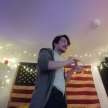The Waking Genius
Analysis of Savant Syndrome

The Acquired Savant
It's 2006, Colorado man Derek Amato is playing a game of football when he attempts to catch the ball while jumping into a swimming pool resulting in a headfirst dive into concrete. He suffered a serious concussion and ended up in a semi-coma. When he awoke he had partial deafness, frequent headaches and memory loss, although another effect of the accident was quite a shock. He was suddenly a proficient pianist. Having never played the piano prior, this seemingly unlocked talent was perhaps an unexpected blessing as he was able to compose beautiful melodies and went on to commercialise his newfound talent by releasing a solo and later an album. As bizarre as it may sound it was not an isolated incident.
It's 1961, Alonzo Clemons is 3 years old when he has a falling accident that seriously impairs his mental development, stunting him with the developmental age of 6 years old. Although he required significant support, he was able to develop his social skills and was able to be relatively self sufficient in later life. I mention this because following the accident, Alonzo seemed to be only interested in clay and went on to become an expert sculptor, able to sculpt perfect imitations of complex images of animals he may have only seen a flash of. He required no formal training and would be considered by Dr Darold Treffert (leading researcher in savant syndrome) to be a genius had he had the basic faculties of a neurotypical person. Because of this limitation he was classed as a Savant.
The word 'savant' is often associated with autism and other developmental disorders due to the remarkably high percentage of gifted individuals that fall into these categories. As many as 10% of autistic people have savant syndrome, a condition that highlights sensational talent and abilities in a particular field, such as art, mathematics or music, despite other cognitive limitations. It is a fascinating phenomenon, given a developmentally impaired persons difficulties to, well.. develop, it is wildly interesting that they are able to master a field of study that is incredibly difficult for anyone to master. It is perhaps slightly misleading though as the persons ability is often judged against their IQ, however IQ is a measurement of someones ability to learn and these savants require no training, so it can be assumed it's something they already know.
A similar phenomenon occurs in an offshoot of a condition called Foreign Accent Syndrome, in which people that suffer brain trauma awake from comas with the ability to speak fluently a language that they had briefly studied in school but had no proficiency for. They struggle to speak their native language for a while and as they recover, their ability to speak the foreign language fades. Traditionally Foreign Accent Syndrome occurs when the vocal chords and/or brain centres of the brain are restructuring themselves following trauma which results in a different sounding accent. Language is a very intricate art requiring countless muscles and micro actions to do, when any of these are misaligned your accent may sound German or American or any accent from anywhere. The ability to fluently speak a new language however is a little more puzzling, though the people that have had this occur have briefly studied the languages they wind up speaking. Perhaps this is a testament to the brains true ability to retain information and process complex information long after the fact? I am not a neuroscientist so I can't attest to this, I just found it fascinating. These are regular people that suffer trauma and wake up speaking a foreign language, it could in theory happen to anyone, which brings me to my next subject...
The Sudden Savant
Savant Syndrome had been described as being either congenital or acquired (through trauma) however Dr Darold Treffert began to realise that this limitation was a mistake. The concept of epiphanies are deep rooted in culture and mythology as a spiritual awakening, but Treffert realised that Savant Syndrome can essentially be provoked out of seemingly nowhere through similar circumstances. He found that neurotypical people were having sudden moments of realisation, an obsessive urge to pursue something, a new hobby or similar, in much the same way as an acquired savant might. It is still profoundly more common in those with, for example, Aspergers Syndrome however this idea of waking up with something unlocked in your brain seemed to be a universal possibility.
I started researching this after I contemplated my own previous experience. To preface I am by no means saying I am a master or expert or anything of the sort. Also to establish some history, I had always had an interest in drawing, but more the doodle type stuff children do, I went on to try and do digital art but wound up enjoying graphic design and photo manipulation, so I rode my film studies GCSE (I didn't do art at GCSE) to college to study digital arts which mostly focused on photography and graphic design. I was an average student, I was admittedly lazy and often handed in work I had done in a day in order to scrape a pass while I tried to figure out what I wanted to do with life. It came to the very end of my first of two years in college and we were displaying our work for a final major project. While the visitors browsed our work we sat in our computer room and had a chat, lounged about, spun on chairs etc. and I being my nosey self went snooping through the drawers trying to find something to entertain myself with, and it was in one drawer on that last day of the exhibition, the last day of my first year of college that I first picked up a paintbrush.
I had always hated painting. I was very much a line art type of guy, I enjoyed illustration and just couldn't wrap my head around constructing something using colour, however that day, in that moment, when I picked up the paintbrush something inside me just clicked. I said it right there and then. "I have to paint". Everyone thought I was just being dramatic or doing a bit but I really meant it. I was broke as hell and living off packet ramen but I managed to scrounge £80 to stock up on paints and canvas. I spent the entire summer painting obsessively. That said I wasn't particularly good but I was much better than I could've imagined. I went on to paint and paint, I had some pushback in my DIGITAL arts course but they gave it a pass. Once college was over I was so enamoured by painting that I committed to a three year Fine Art Degree. It was here that my love for painting was quashed. My first year of formal study and I instantly felt like I was trapped in a box and I had to revert to something more familiar in order to feel safe again. The sense of freedom and passion had been extinguished. I don't say this to besmirch my university, rather to exemplify the harm that formal study can do.
Acquired, sudden and congenital savants alike seem to unlock a preexisting knowledge or instinct for a subject requiring no formal study because it is knowledge they already had. I made the mistake of trying to professionalise my newfound skill in fine art and it was to my own detriment. My course essentially made me unlearn what I had realised in myself to make space for the lacklustre lessons they wanted to inject in place. I do not necessarily consider myself a sudden savant, if I do it is on a much smaller scale, however that unanimous experience of 'just getting it' is very familiar to me. Perhaps it's just profound inspiration. I don't know, it's a difficult thing to explain otherwise. I had similar experience with music, skateboarding and writing, none of which I consider myself an expert with but I became competent at all of these overnight.
Perhaps this phenomenon is more common than we think, just on a smaller scale. Perhaps moments of intense inspiration is a key in our brain turning, slowly unlocking a deeper understanding of something. The question I suppose that needs answering is how do we nurture that development? It brings me hope to think that there is an untapped access to greater knowledge and understanding stored within us, but how do we access it? As of now, we don't know. Maybe one day...
About the Creator
Ryan Appleyard
I just want to write stuff.






Comments
There are no comments for this story
Be the first to respond and start the conversation.